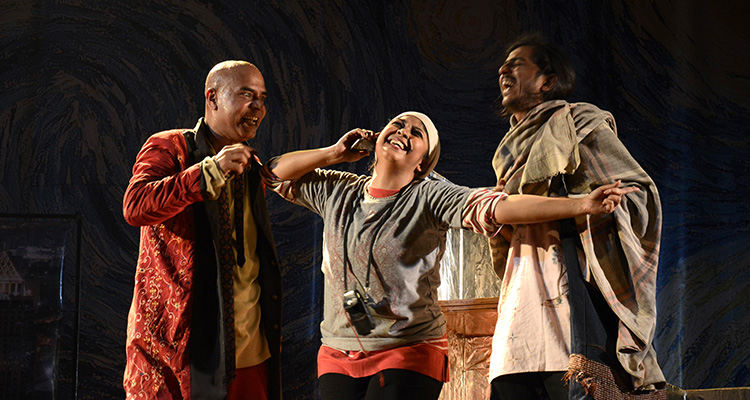Haoai
if you are not like everybody else, then you are abnormal, if you are abnormal you are sick [mad]
— Michel Foucault
A search for the milk of human kindness, a pursuit to find sanity in insanity brought Haoai: The Eleventh Planet (a play directed by Goutam Halder) on stage last night in the 11th Mahindra Excellence in Theatre Awards and Festival.
When the curtain opened, in the background Van Goghs painting The Starry Night (it depicts the view from the east facing window of his asylum room just before dawn) along with the supposed junk of the three vagrants, which later turns into a rocket, made people anticipate a fascinating act of drama. According to the director Goutam Halder, when he sent a picture of the set to the Slovenian playwright Evald Flisar (Writer of the play), he said that this is the best stage design he could have ever imagined for his own play.
For Halder, the cyclorama (oblivion) created through Van Goghs painting did justice to the theme of running out of time. The freedom clock for the three vagrants who are also escapees from a mental asylum was fading. The tick-tock was becoming feebler and feebler as the Bhadralok (community of decent, hardworking people) was pushing too hard with all its temptations for their unquestionable surrender.
Throughout the play the three vagrants tried to defy the conventions of the societal framework, but one by one, all ended up searching their idealized Eleventh Planet in the Bhadralok or the community of Bonkers.
According to Dyuti Ghosh (Actor, Meni) the play explores the untouched grounds of vagrant psychology. The play attempts to catch that insane spirituality which makes vagrants let go of this material world (maya) but in the process it also portrays the consequences related to it.
Apart from being a hilarious comedy, the emotional moments in the play made people to wipe their tears.
Polu: (to Meni) You killed your own one-year child by feeding him carrots, which came back as it is and you washed them and fed him again.
Meni: (crying) I was just finding a way to recycle baby food for poor families.
The scene in which Polu and Meni set up a table and imagined to eat all the Bengali delicacies made people think about this strata of society whose position is relegated to that of mad people.
According to Halder, these people may be being mad but they are not fools. They are different and that is why they are sick. As Foucault says, Being different is a kind of power which is being suppressed in the mental institutions, the play promptly questions the scales of society which labels a person sane or insane. Because at the end of the day we all are insane in some way or another, otherwise the progress human kind has made would not have been possible.
As Albert Einstein said:
If at first the idea is not absurd, then there is no hope for it.
— Abhishek Tiwari




Leave a reply